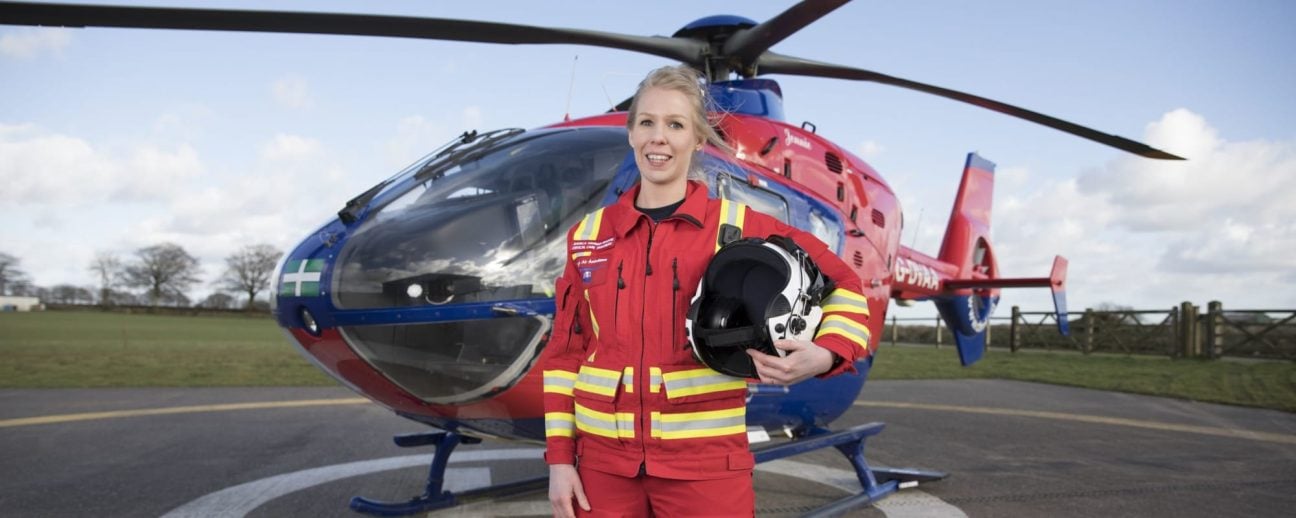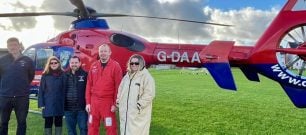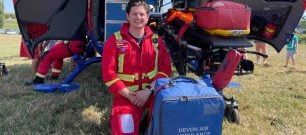
Specialist Paramedic in Critical Care, Jess, talks about why women are less represented in Helicopter Emergency Medical Services.
Specialist Paramedic in Critical Care, Jess, is undertaking some important research at part of her higher MSc degree that could change how women access the field in which she works. Here’s more from Jess about her progress on the project so far.
‘When I moved from working as a paramedic for the ambulance service to a paramedic for Devon Air Ambulance, I became aware of how few women there were in our operational team.
‘As part of the MSc Prehospital Critical Care/Retrieval and Transfer I am studying, I wanted to explore whether this was unique to the Helicopter Emergency Medical Service (HEMS).
‘Although in the UK women make up around half of all doctors and paramedics, within HEMS just 1 in 5 HEMS doctors and 1 in 4 HEMS paramedics are women.
My research involves exploring potential barriers that have resulted in gender inequity within UK HEMS and identifying what could be done to increase inclusivity and close the sex gap.”
‘I am gathering data using an anonymous online surveys open to paramedics and doctors who have considered applying, intend to apply or have applied for HEMS but are not currently working for HEMS.’
Jess began gathering responses to her survey in March 2022 and has already gathered a substantial amount of data.
Resilience is not gendered
Within the South Western Ambulance Service NHS Foundation Trust (SWASFT), as well as undertaking many different types of missions, Jess is part of the special operations response team, which attends chemical, biological, radiological, nuclear and explosive incidents and marauding terrorist attacks. The demands of the role clearly demonstrate that resilience and fortitude aren’t qualities that can only be attributed to men.
Nevertheless, as Jess sought to apply for her role at Devon Air Ambulance, she encountered some preconceived notions along the way.
As I went through the lengthy application and selection process for HEMS, I received comments from colleagues elsewhere such as “Off to join the boys’ club?”, “You’ll only get into team alpha if your face fits”, “Do you think you’re strong enough to do HEMS?”, or, “Isn’t flying around in a helicopter dangerous for women?”
‘Initially I thought these remarks were said in jest, but it transpired that these were real concerns that I, a cissexual woman, might not fit in at a workplace that is perceived as masculine.
‘It wasn’t until I joined DAA that I became acutely aware of the lack of women in our operational team and it dawned on me that almost every HEMS clinician I had ever encountered was, in fact, a man. I felt retrospectively naïve and ignorant that this had not crossed my mind before, and I began to reflect on these comments.
‘Within the current service, we currently have 4 paramedics and 4 doctors who are women, and 19 paramedics and 9 doctors who are men. I wanted to explore if this was unique to our organisation and found that although in the United Kingdom women make up almost half of all doctors and paramedics, within UK HEMS this reduces to approximately 20% of HEMS doctors and 24% of HEMS paramedics.’
What's holding women back in HEMS?
‘Although no research currently exists on the causes of gender inequality in HEMS, the downward trend as women move into specialist roles is not unique to prehospital emergency medicine (PHEM), nor the wider science, technology, engineering, mathematics and medicine (STEMM) community.
‘Research does exist in other specialist and leadership institutions, such as surgery and academic medicine; these working environments have many similar features to working for HEMS such as unsocial shift work, high-pressure environments and the need for years of additional speciality training.
‘It is important to understand what is causing the gender gap, because in surgery for example, gender diverse teams have positive effects on organisational productivity and success as well as on patient outcomes, including statistically significant decreases in 30-day patient mortality and improved surgical outcomes such as fewer complications, fewer re-admissions, and reduced length of stay; there is no reason why these positive effects would not be reflected in HEMS.’
Barriers to launch
Current organisational barriers cited in surgery and academic medicine include:
- A masculine culture, colloquially termed ‘the old boys club’, that lacks inclusivity and conveys a sense that women do not fit in; this certainly aligned with the views expressed by others when I was applying to HEMS.
- A lack of flexible/part time work which may be desirable for a multitude of reasons including childcare, dual-role work or other commitments.
- Unconducive workplace systems for family life/child-care with many articles citing that a desire to have children is a barrier to career progression and that women with children must make a family-sacrifice for work.
- A lack of role models or mentors caused by the dearth of women in these specialist or leadership roles to support others in their career progression; again, when I joined HEMS I realised that women role models working in critical care were few and far between.
- Gender/pregnancy/maternal/parental discrimination or an openly sexist environment where people heard derogatory and abusive remarks towards or about women in the workplace.
What's next?
‘I am incredibly grateful to everyone who volunteered their time to complete my survey and I will be reviewing the responses over the coming months.
I truly see this research as a fantastic opportunity for positive change.”
‘If it was highlighted that career talks or mentorship groups could contribute to gender equity in HEMS, I would endeavour to facilitate these on a national scale; if participants were to highlight that current social media imagery indicates that men are the norm and woman are the variation, I would incorporate this into my follow-up document of recommendations that I plan to share nationally to all air ambulance employers.
‘Finally, I hope to publish my results in a peer-reviewed journal to reach a wider audience and close the sex gap in HEMS.’
Proud of our workforce
Devon Air Ambulance is immensely proud of our staff and we absolutely support the work Jess is undertaking to change the landscape – and airscape! – of HEMS for women in the field.
We enthusiastically support her research and look forward to following her progress and championing the positive impact of her work, not only within our own team, but of course the potentially far-wider reaching impact of her efforts for women and for the service as a whole.



